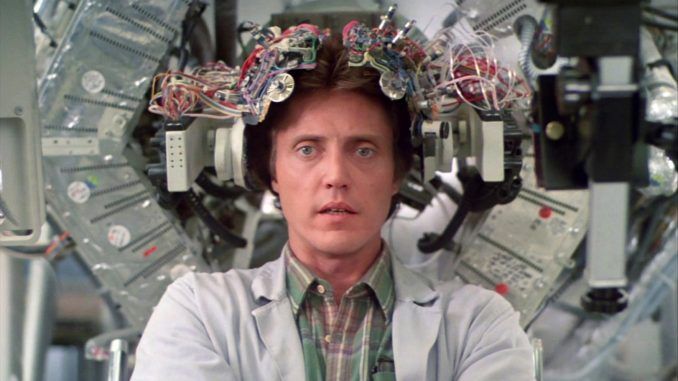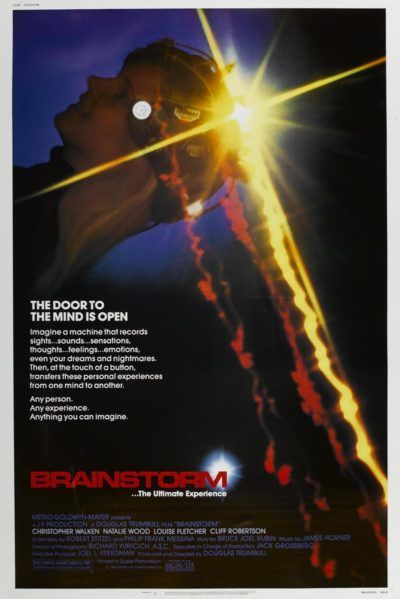
Rating: C
Dir: Douglas Trumbull
Star: Christopher Walken, Natalie Wood, Louise Fletcher, Cliff Robertson
Trumbull was one of the most influential special effects creators of his time, working on everything from 2001 through Close Encounters to Blade Runner. But he directed a pair of science-fiction movies: Silent Running in 1972, and this. He does not seem to have enjoyed the latter experience. This opinion was no doubt partly shaped by the drowning death of Wood late in production, an incident which has unanswered questions to this day. It caused MGM to try and pull the plug on a difficult production, but insurer’s Lloyd’s of London opted to fund the remaining production costs instead. Trumbull subsequently said, “Moviemaking is like waging war. It destroys your personal life, too,” and never made another feature.
This was made the same year as Videodrome, and covers at least adjacent territory, both being about the topic of artificially-induced experience. They also benefit from a strong central performance at the core, from Walken and James Woods. However, this has aged far worse, particularly on the technology front. It’s all tape drives and primitive robotics, though we reach peak eighties with the suitcase-sized contraption, including a dial-up modem, Walken’s character uses to connect remotely to a computer. He is researcher Michael Brace, who along with Lillian Reynolds (Fletcher), has invented a system for recording experiences, allowing them to be played back for another person. Not all is roses. Michael’s marriage to Karen (Wood) is on the edge of collapse, while his boss (Robertson) wants to hand the project to the military-industrial complex.
 I’m not sure why the latter appears to come as a surprise. It’s the second most-obvious use for such a device (and yes, they briefly cover the most obvious one too, this being a time when you could have tits in a PG movie). The offensive capability is made clear when one character records their heart attack and death, creating a tape capable of killing anyone who experiences it. That feels like something out of a Black Mirror episode, yet its potential is never realized. Instead, the film heads off to a finale nearer to Toys, with Michael turning the facility against its military bosses. Foam and pratfalls are an awkward contrast to the earlier, dark tone, and the “hacking” scenes feel especially dated.
I’m not sure why the latter appears to come as a surprise. It’s the second most-obvious use for such a device (and yes, they briefly cover the most obvious one too, this being a time when you could have tits in a PG movie). The offensive capability is made clear when one character records their heart attack and death, creating a tape capable of killing anyone who experiences it. That feels like something out of a Black Mirror episode, yet its potential is never realized. Instead, the film heads off to a finale nearer to Toys, with Michael turning the facility against its military bosses. Foam and pratfalls are an awkward contrast to the earlier, dark tone, and the “hacking” scenes feel especially dated.
Then, Trumbull basically goes full 2001 at the end, with a psychedelic “trip” sequence for his hero, that simply left me bemused. It’s clear the director put a lot of thought and effort into the effects, shooting the “experience” segments in 70mm, a greater resolution than the rest of the movie. Even if this is invisible on home viewing, I still appreciate the effort, and the production design has a retro-futuristic feel to it that’s quite appealing. The number of product placement references to Coca-Cola is also amusing, from vending machines through to a robot stacking Coke cans. It just doesn’t feel Trumbull put anything like the same amount of effort into the story or the people who inhabit it.
